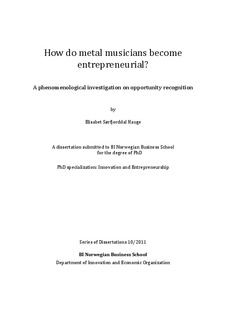How do metal musicians become entrepreneurial? A phenomenological investigation on opportunity recognition
Abstract
In this dissertation, becoming entrepreneurial mean that musicians undertake commercial activities that are necessary for artistic creativity and performance. In order to analyse the entrepreneurial process, I have investigated a group of metal musicians, for whom acting entrepreneurially is a life strategy as a musician in a changing world. Making money is rarely metal musicians’ motivation in entrepreneurial processes; instead their inspiration is the musicians’ independent creative desire that contributes to their self-realization. Metal musicians often express an “anti-establishment” view of life - a characteristic that distinguishes them from many other people. This dissertation suggests that metal musicians who become entrepreneurs are different entrepreneurs than, for example, developers of technology or establishers of services such as dentists, plumbers, restaurateurs, etc. Musicians’ way of approaching entrepreneurship is helpful to cast light on many different aspects of entrepreneurial processes.
The dissertation’s description of the process of opportunity recognition can be used to illustrate how becoming entrepreneurial is the result of social processes. Without an audience' approval and faith, the entrepreneurial creative process would probably not be maintained. Related to these statements, one of my main findings is that the logic of existing in a situation of becoming and being both a musician and an entrepreneur demands credibility. The more credible a musician is, the more entrepreneurial opportunities appear and are available to be explored. Opportunity realized in outcomes such as sound studios, record companies, albums, tours, Street Teams, loudspeakers and the like, are symbols that musicians leave behind like footprints in the process of becoming entrepreneurial.
In the final chapter of my thesis, I discuss the utility value of my investigation. The main value of my thesis applies to three areas of entrepreneurship research. Firstly, it contributes to the discussion about what kind of knowledge phenomenologically oriented research can offer to the field of entrepreneurship and the opportunity recognition perspective. Secondly, phenomenology offers a description of how entrepreneurship happens among metal musicians in all its varieties and ambiguities. Thirdly, I argue that phenomenological research results should be applied in policy making that aims to support entrepreneurship in the cultural industries.
